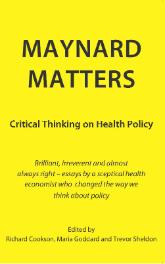Critical Thinking on Health Policy
For any health economist, Alan Maynard is a reference. We've been reading his contributions for decades and now we can read a book (free to download) that has two parts. The first shows different views of his role on health economics and policy, while the second is a selected collection of articles and book chapters.
I would like today to highlight what Rudolf Klein says about what he calls "The Voltaire of Health Economics":
I am sceptical about some of the claims to special policy wisdom of economists operating in
the health field. Too many, I find, seem to have a naive faith in QALYs, reflecting methodological innocence and an unreflective utilitarianism. Too many, in my view, appear to think that evidence should guide policy action in situations where only policy action can produce the evidence. Too
often I find myself bemused by statistical wizardry, wondering whether the inevitable simplifications required by modelling don’t exclude crucial dimensions of a complex world
The reasons for my admiration stem from Alan’s specialcombination of energy, moral drive and irreverence.
Alan is a moralist. For him a failure to act on – or, if need be, generate – the evidence for a policy intervention is an ethical failure. So identifying what interventions give the “biggest bang for the buck” is the moral obligation of all policy makers. He sees a reform of the NHS, or indeed of any health care system, “as an experiment on fellow citizens”, which has to be justified and undertaken responsibly, and not on some ideological whim.I agree absolutely on Rudolf Klein views.
In chapter 13 you'll find a book chapter "Health Economics: Has it fulfilled its
potential?" that is abstracted by the editor's with this words:
Whilst Maynard argued strongly for the importance of generating and using cost-effectiveness data in decision making, he was concerned that this had encouraged an industry of health economists rolling out economic evaluations. The victory of the health economics perspective in how to ration health care resources led to health economics becoming the slave of the cost-effectiveness industry, feeding regulators such as NICE and also the pharmaceutical and device manufacturers seeking to get their products approved and funded. This distorted the role of health economics and only used a small part of the full repertoire of perspectives and techniques that economics could apply to health and healthcare problems. He argued here that health economists need to keep a strong link with economics as a discipline and apply themselves to a wider range of problems such as supply and demand, the workforce, incentives and behaviour change, pricing and equity.As the front page says:
Brilliant, irreverent and almost always right – essays by a sceptical health economist who changed the way we think about policyA must read.
PS. The best books of 2016 by FT

